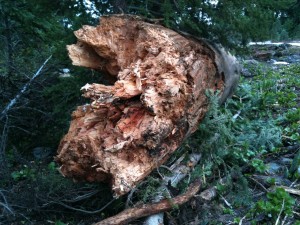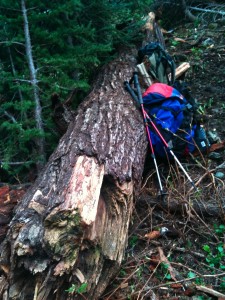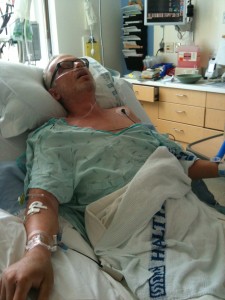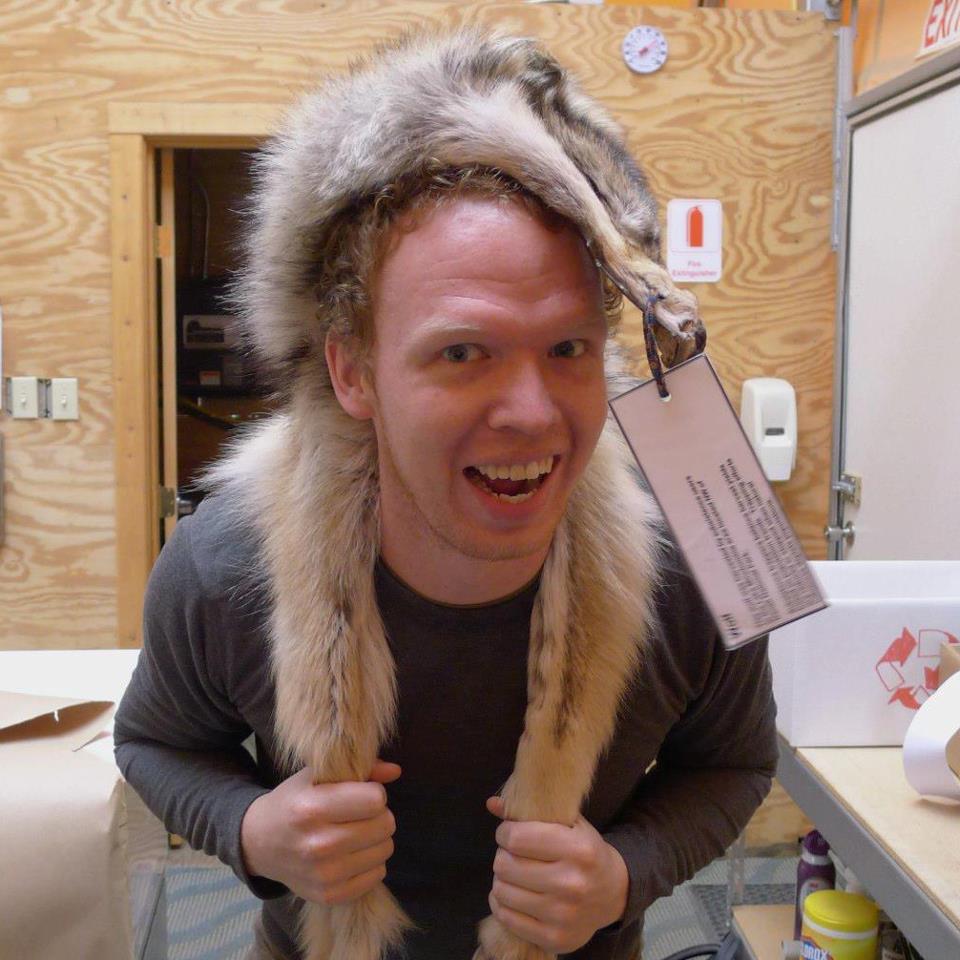First of all, my father Gary Wiens has been severely injured and he’s in stable condition at Harborview Medical Center, one of the best trauma centers in the country. He’s broken his ribs and pelvis, but there are no signs of neurological damage and he’s completely aware and coherent. He’s a very tough guy, and things have worked out as well as possible considering what happened.
On Sunday July 11th, Gary, our friend Charlie, and I were hiking near Mount Baker in the North Cascades. We were hiking across an avalanche chute when we heard a loud crashing sound from above us. I looked up, and saw a huge log, eerily silhouetted against the sky, falling down from the cliffs above us. I remember thinking that I should run out of the way, and then realizing that I was already running. Charlie and I both ran up the trail and got out of the way, but Gary was behind us and had to take refuge behind a large fallen log. The falling log hit the log he was hiding behind, and both of the logs rolled over him and continued down the slope. The whole incident happened in slow motion; it was perhaps the longest few seconds of my life.
Charlie and I immediately rushed to Gary to help him. The first few minutes were the scariest, blood was coming out of his mouth and each of his shallow breaths came out as a horrible moan. It was made worse by the fact that his eyes were glazed over and were moving erratically. We had seen a ranger with a radio earlier, and so Charlie immediately left to find him and summon help. There were two hikers behind us, Philip and David, who were both extremely helpful and supportive. It would have been much worse if I were alone. After a few minutes Gary calmed down immensely. His breathing slowed, and he was able to speak and focus his eyes. I did a quick survey of his injuries; I checked his pupils for concussion, and verified that he could move and feel his extremities.
At this point, Gary asked that we put all his warm clothes on him. This was surprising and reassuring. Here he was, severely injured and in pain, and he very calmly asked us to do exactly what they teach in a wilderness first aid course. We were able to strip off his cotton t-shirt and put all of his warm layers on his upper body. He wanted to be moved to a more comfortable position, but when we lifted him he complained of pain in his hip and so we attempted to make him as comfortable as possible on the hillside.
After about half an hour, Charlie returned with the ranger, a tough-looking guy named Ben Lehman. Not only was he able to call in help on his radio, but he also was a trained wilderness EMT. What a stroke of luck! Ben was amazingly helpful. He was calm and collected, and from what I remember from my limited training, he did all of the first-responder procedure by the book. He did a variety of diagnostic checks, everything from taking pulse to checking Gary’s entire neck and spine for possible fractures. Gary was calm and coherent this entire time, although he did cry out in pain when we moved him to check his spine. After he evaluated Gary, Ben pulled out a sleeping pad, and with the help of the two hikers we very carefully moved Gary up onto the trail.
The accident had happened about two and a half miles from the trailhead, over relatively rough terrain. At this point, I ran to the trailhead, both to put the dog in the car and to ensure that the EMTs arriving on foot were able to find their way to the accident. It felt good to be moving, to be doing something that felt constructive. I met some EMTs from Skagit County at the trailhead, and headed back to the site of the accident. By the time I returned, two very competent EMTs from the Navy had been dropped from a helicopter and were preparing to strap Gary into a backboard to be airlifted out. We could tell Gary was in good hands, with both the Navy EMTs and the Skagit County EMTs, so Charlie and I said our goodbyes, and hiked out to the trailhead to race Gary to the hospital.
We worked out later that Gary had arrived at Harborview Medical Center before Charlie and I even reached the car. My predominate emotion at the time was not fear, but relief. We had done all we could for Gary; the rest was out of our hands. The drive back to Seattle was uneventful, and we arrived at the hospital shortly after midnight. We arrived to find that Gary was in stable condition, and had already been through a number of scans. He was hooked up to all manner of equipment, including tubes inserted into his chest to drain air that had escaped during the accident. He was conscious and glad to see us. We then found that almost all of his ribs had been fractured, and his pelvis was in several pieces. Thankfully, there appeared to be no major organ damage, and his head and spine were unharmed.
We were then told that he’d need to have surgery on his pelvis, and that it was possible he’d have to wait over a day for this to be done. At this point, Charlie and I were both exhausted, so we said goodbye and went home to sleep. The following morning I found out that they were able to get Gary into surgery early in the morning, and had re-aligned his pelvis, and installed a metal bar to keep it stabilized. The metal bar sticks out from his hips, and it looks like something you might hang a hand towel on.
Gary has since been moved out of the ICU, and is doing quite well. He should be out of the hospital relatively soon. A full recovery is expected, although the hospital staff has been very reluctant to give specific numbers on recovery times. The one concrete number we’ve been given is that it’ll take at least six weeks for his pelvis to become “load-bearing”. The recovery process is going to be frustrating and painful, and he’ll need lots of assistance and rehabilitation.
This has been a major traumatic event, but I’ve been quite impressed with how well everyone has handled it. Gary has been very strong, and that has been greatly reassuring to Charlie and I. Starting with Ben Lehman, all of the medical staff we’ve dealt with have been very helpful and supportive. I would like to thank the ranger Ben Lehman, our friend Charlie Madden, the Skagit Country EMTs, the Naval EMTs, the excellent staff at Harborview Medical Center, and everyone else who has been involved in ensuring Gary’s safe recovery.
Gary’s recovery is going to be a long and arduous process. He’s going to need all the support we can give him. I’m sure he’ll appreciate any phone calls and letters you can send his way. We’re not sure how long he’ll be at the hospital, so you can send any cards and letters to my house and I’ll make sure he gets them.
As a child, you grow up believing that your father is invincible. This accident has only confirmed that hypothesis. For such an unfortunate incident, it’s been amazing how fortunate we have been. I’m very lucky to have Gary as a father, and my fear of losing him has been overshadowed by my belief that in a few years this difficult time will be little more than a memory.
For more information, see this article in the Helena Independent Record.




